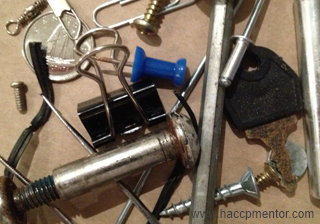In this episode we are going to check out some ideas for validating pre-requisite programs and discuss if metal detectors are really essential in a food business.
Video Timeline
00:00 – What’s in this episode
00:30 – External consultants and 3rd party audits
01:18 – Metal detectors in your business
02:20 – Are your bench scales leveled?
02:35 – Food recall review
03:03 – Ideas for validating pre-requisite programs
05:18 – Connect and share HACCP Mentor
Show Notes
Welcome to this weeks HACCP Mentor Review. In this episode we are going to check out some ideas for validating pre-requisite programs and discuss if metal detectors are really essential in a food business. Each episode of HACCP Mentor Review has an action item to help you keep on top of your HACCP requirements – so this week is no different. Let’s kick off this review with discussing the role of your food safety consultant.
Can external consultants represent your company during a certification audit?
If you engage a food safety consultant to advise on your HACCP plan and food safety system please keep in mind that during an external 3rd party certification audit, they may not be allowed to answer questions directly on behalf of the business. During an audit, the auditor needs to be able assess the knowledge and implementation competency of all food handlers and management.
If you have a good food safety consultant, they should have trained and advised your business adequately so employees can answer all questions as required by the auditor.
Are metal detectors essential in a food business?
Any type of metal contamination in your product is definitely a food safety issue – I am sure we can all agree on that. I have pretty strong views around this subject mainly because I have observed so many metal detectors fail to detect metal imbeded in the product when tested during a certification audit.
Any good metal control program first starts with prevention rather than detection. You need to stop the metal contamination from happening in the first place. My first step would be to implement a suitable preventative maintenance program and foreign matter prevention program. Both programs should have adequate monitoring to ensure that the programs are being successfully implemented.
To strengthen your program you can then look at detection and removal equipment including magnets, metal detectors, sieves, visual, xray etc.
Action of the Week
This week’s action item is to check that all bench scales are correctly levelled. Unlevelled bench scales may give you an incorrect reading which can be critical to weights and measures.
Food Recalls
Heaps of allergy alerts published by the Canadian Food Inspection Agency and the US FDA. There seems to be a run on undeclared sulphites and effects food products such as dried mushrooms, dried coconut, balsamic dressing, dried apple.
Ideas for validating pre-requisite programs
The easiest place to find validation information to support control measures documented in prerequisite programs, is to check your food legislation applicable to your country of manufacture.
Here a just a few to get you thinking or to give a bit of guidance:
- Cleaning – Ask your cleaning chemical supplier to provide scientific data to support that their chemicals will prevent/reduce/eliminate particular pathogens or microbes.
- Metal Detector – Advice and report from the metal detector supplier/manufacturer that the piece of machinery is going to perform a certain way ie detect type of metal, size of metal, suitability of your product at different temperatures.
- Allergen cross contact – Research levels of allowable allergens in finished products or use the VITAL system.
- Personal Hygiene – Regulatory requirements around good personal hygiene practices are a great source of validation for these.
- Approved Suppliers – HACCP certificates issued by certified (eg. JAS-ANZ) certification providers. Lab results from suitably certified laboratories (eg. NATA) and if they are also certified to undertake the testing.
- Calibration – reference calibration equipment (eg scales) that have been certified externally or from certified reference weights.
- Receival – Regulatory requirements around receiving potentially hazardous foods.
Wrap Up
That’s is the end of this weeks review so I hope you have enjoyed it. If you have any questions please don’t hesitate to send me an email through haccpmentor. Just click on the Contact page to contact me directly. Until next time – I am Amanda Evans from haccpmentor.com. See ya.




Really nice styling and superb articles, absolutely nothing else we need : D.
Hello Amanda,
First of all I’d like to thank you for the interesting topics you are discussing.
I was wondering how much more precise information on validation of pre requisites can I get, in order to get my process controlled and my product safe.
Many thanks
Javier Chavarría
Hi Javier
For prerequisite programs (PRPs), validation is about making sure that whatever control method you have put in place is actually going to work. For example, the strength or concentration of sanitiser or cleaning chemical that you use is actually going to remove/kill/reduce the hazard to safe levels. Some times you can just refer to your local legislation as a point of validation (a bit like you would do for say your critical limits). This is the easiest source of theoretical validation. Keep an eye out in the coming months for more information on this topic.
If you need specific examples just let me know.
Regards….Amanda